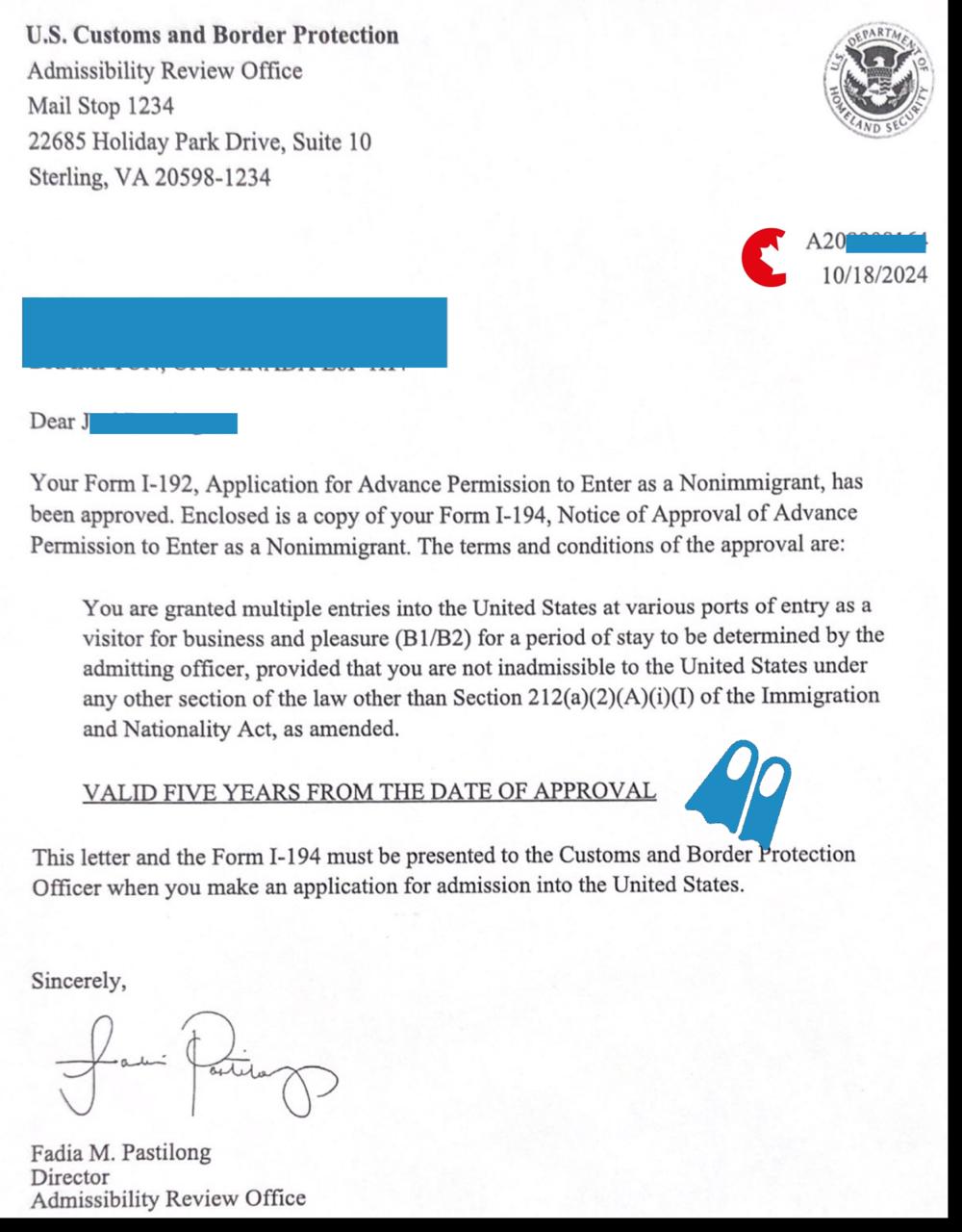
24/7 Customer Service
1 (866) 922-8159
QUALIFY BEFORE December 16th, 2025
Fill out the form for an instant evaluation
Your information is safe
What Should I Do If the U.S. Denies Me Entry over a Criminal Record?
You had your U.S. travel plans completed, booked the flight, packed your luggage, and got a passport. You probably were anticipating your visit to a business partner, friend, or family member. But you had no clue that a previous criminal record would return to haunt you at the border.
Approaching the U.S. Customs and Border Protection (CBP) officer, you handed over your passport and responded to the usual inquiries. Everything seemingly went well until the officer surprised you by requesting that you step aside for extra investigation. They took you to a secondary inspection area to interrogate you and take your photograph and fingerprints. You are sure you have paid your dues to society, but this makes you feel like a criminal.
Next, the officer declared you inadmissible to the U.S. over a criminal record against your name. Bewildered at the turn of events, you found it surprising your history could prevent you from visiting America. Though you attempted to explain that it was a minor offense or that it happened many years back and possibly already obtained a Canadian pardon, the officer turned deaf ears and continued in his tracks. He gave you a document called a Notice of Refusal of Admission, which outlined the rationale behind the denial and your legal right to apply for a waiver of inadmissibility. Lastly, he escorted you to the Canadian arena of the border, where you had to process a return trip.
Anger, humiliation, and helplessness were the best ways to describe the feelings running through your mind. You wondered if there was a way to overcome these challenges and re-visit the U.S. afterward – if you had any alternative travel routes.
There is good news – you have alternative travel routes to the U.S. A denied entry to the United States is never the end of the road. There are other options to circumvent inadmissibility and get access to legally visit the U.S. However, it depends on the extent and form of the offense in question, the period since your completion of the sentence or conviction, and other details about the U.S. trip, such as its duration or purpose.
This chapter introduces you to the U.S. entry waiver and Canadian pardon. These two exceptions can restrict access to your Canadian criminal record and assist you in circumventing your inadmissibility to the U.S.
Here we go!

What Does a Canadian Pardon Mean, and How Does It Affect Your Inadmissibility into the U.S.?
A Canadian pardon, also called a record suspension, allows people in Canada to seal their criminal history from the public. A Canadian pardon would let you apply for jobs, volunteer, travel, and live without the discrimination and stigma of holding a criminal record.
Although a Canadian pardon will not change your immigration status or clear your criminal record, it restricts access to your record within Canada. Your criminal history still exists, and is accessible to specific authorities, like the police, parole board, and the judiciary.
More notably, a Canadian pardon has no legal effect in the U.S. as the country doesn’t acknowledge record suspensions or Canadian pardons. Even if you have a Canadian pardon, the U.S. Customs and Border Protection (CBP) may still address you as someone with an existing record. That means you might require a U.S. entry waiver to visit the U.S. legally.
What Is a U.S. Entry Waiver, and How Does It Affect Your Inadmissibility into the U.S.?
A U.S. entry waiver allows inadmissible persons to visit the U.S. for a specific time and purpose. The document does not change your immigration status or clear your criminal record. However, it waives your inadmissibility for the duration and conditions of the visit.
A U.S. entry waiver is only accessible if you’re temporarily visiting the U.S. for purposes like tourism, business, family reunion, and medical treatment. It is also called a nonimmigrant waiver. If you plan to work, study, or reside in the United States of America permanently, you will require a separate form of waiver, like a hardship waiver or an immigrant waiver (both are beyond the scope of this chapter).
Here are some differences between a Canadian pardon and a U.S. entry waiver:
- While the U.S. Department of Homeland Security issues the U.S. entry waiver, the Parole Board of Canada issues a Canadian pardon.
- While a U.S. entry waiver is based on America's immigration law, a Canadian pardon is based on Canadian criminal law.
- While a U.S. entry waiver guarantees your admission into the U.S., as long as you abide by its accompanying terms and conditions, a Canadian pardon does not guarantee your admission into the United States.
- While a U.S. entry waiver applies to specific grounds of inadmissibility, such as a person's criminal, health, or immigration violations, a Canadian pardon applies to all the crimes you are convicted of in Canada.
- While a U.S. entry waiver is valid for a specific period, typically one to five years, a Canadian pardon is indefinitely valid unless the individual commits a new offense.
How to Qualify for a U.S. Entry Waiver?
Here are the requirements you must fulfill to qualify for a U.S. entry waiver:
- You are inadmissible into the U.S. over a health-related purpose that is now non-existent or an offense that transpired over 15 years ago.
- You have a valid purpose for visiting the U.S., that could be medical treatment, business engagement, tourism, or family reunion.
- You have paid all restitutions, fines, or compensations connected to the offense.
- You have shown penitence for your offense or crime.
- You pose no threat to the safety, security, or welfare of the U.S. or its citizens.
- You have abided by any parole, probation, or conditional release clauses connected with your offense or crime.
- You have no pending appeals, charges, or outstanding warrants connected to the offense or crime.
- You have gone through reform or rehabilitation since your offense or crime.
- You hold no other grounds for inadmissibility, such as terrorism, fraud, or security.
Resolving U.S. Entry Issues
For Canadian residents with a criminal record or past border refusal, obtaining a U.S. Entry Waiver is the only recognized method to regain admissibility into the United States. This process requires thorough preparation, accurate documentation, and adherence to the requirements set by U.S. Customs and Border Protection.
With extensive experience assisting Canadians, we have successfully guided over 15,000 U.S. Entry Waiver applications to completion. Our team ensures that every step is handled professionally, minimizing delays and ensuring compliance with all regulations.
Our Services Include:
- U.S. Entry Waivers for Criminal Records – For individuals with past criminal convictions preventing entry.
- U.S. Entry Waivers for Overstay Issues – Resolving situations involving unauthorized stays in the U.S.
- Border Inquiries Assistance – Guidance for addressing specific concerns raised at the border.
- Emergency Parole Applications – Support for urgent cases requiring immediate resolution.
Start Your Application
Start Your Application If a U.S. Entry Waiver is required for your situation, begin the process today. Professional assistance ensures efficiency and compliance, helping you secure the documentation needed to cross the border confidently and without complications.
Visual Proof of Success
What does success look like? Here's a sample of an approved U.S. Entry Waiver issued via the eSAFE portal:

By choosing our services, this can be your success story. Start your journey toward admissibility today and experience the confidence of seamless travel.

Eligibility
Check to see if you are eligible for a U.S. Entry Waiver.


Application Form I-192 for Advance Permission to Enter as a Nonimmigrant e-SAFE process for citizens of Canada:
 Canada
Canada
 Palau
Palau
 Federated States of Micronesia
Federated States of Micronesia
 Marshall Islands
Marshall Islands
The 41 Entry Clearance Program Member Countries:
 Andorra
Andorra Australia
Australia Austria
Austria Belgium
Belgium Brunei
Brunei Chile
Chile Croatia
Croatia Czech Republic
Czech Republic Denmark
Denmark
 Estonia
Estonia Finland
Finland France
France Germany
Germany Greece
Greece Hungary
Hungary Iceland
Iceland Ireland
Ireland Israel
Israel
 Italy
Italy Japan
Japan South Korea
South Korea Latvia
Latvia Liechtenstein
Liechtenstein Lithuania
Lithuania Luxembourg
Luxembourg Malta
Malta Monaco
Monaco
 Netherlands
Netherlands New Zealand
New Zealand Norway
Norway Poland
Poland Portugal
Portugal San Marino
San Marino Singapore
Singapore Slovakia
Slovakia Slovenia
Slovenia
 Spain
Spain Sweden
Sweden Switzerland
Switzerland Taiwan
Taiwan United Kingdom
United Kingdom
Preparation Checklist for Visiting the United States
- Ensure your passport is valid and not expired.
- Bring adaptors for 110V power outlets if required
- Prepare itinerary and confirm accommodation details.
- Secure travel insurance.
- Explore transportation options for getting around.
- Carry sufficient local currency (USD) and payment methods.
- Download travel maps and relevant apps.
- Arrange for internet access during your stay.
- Stay updated by following the latest news.
- Have emergency contact information readily available.
- Consider a language translation app if needed.
- Obtain your approved U.S. Entry waiver from DHS, or necessary travel authorization.
© 2024 SERVICES OF CANADA - All Rights Reserved